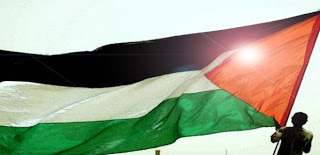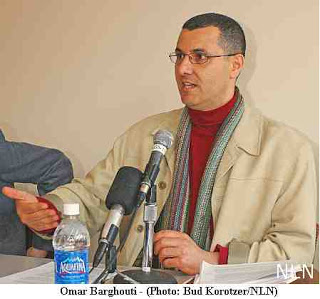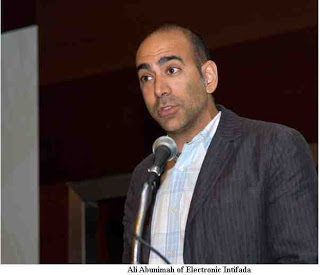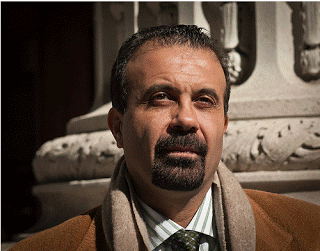Over a decade ago, Ali Abunimah and Hussein Ibish issued a statement ‘Serious Concerns About Israel Shamir’ concerning the virulent anti-semitism of Shamir. Like Atzmon, Shamir too traded on his Israeli connections, yet his language about Jews as ‘a virus form of a human being’ set alarms bells ringing. His cause was not support of the Palestinians and anti-Zionism but anti-Semitism and holocaust denial. Yet in an e-mail to me (12th June 2005) Atzmon described Shamir as a ‘unique and advanced thinker’.
Atzmon has gone out of his way to support and associated with those who declare themselves ‘proud’ to deny the holocaust. People like Paul Eisen, whose purpose is to ‘contextualize and re-humanize the person of Adolf Hitler, the National Socialist regime, and, indeed, the German people….’
It is therefore extremely welcome that some of the principal writers, academics and activists in the Palestinian community – people like Ali Abunimah of Electronic Intifada, Omar Barghouti of the Boycott National Council, Professor Joseph Massad of Columbia University and Haidar Eid of Gaza, have put their names to this succinct and devastating statement. It makes clear, above all, that the liberation of Palestine, the Right of Return of the Refugees and the end to Zionism and Apartheid in Israel have nothing whatsoever to do with support for anti-Semitism.
This comes on top of the critique ‘Not Quite “Ordinary Human Beings”—Anti-imperialism and the anti-humanist rhetoric of Gilad Atzmon.’ headed byAs’ad Abu Khalil of The Angry Arab News Service.
Atzmon rejects the idea that Israel is a settler-colonial state. This merely lets Jews off the hook. In The Atzmon Defamation League, he writes that: ‘As long as Zionism is conveyed as a colonial project, Jews, as a people, should be seen as ordinary people. They are no different from the French and the English, they just happen to run their deadly colonial project in a different time …. Israel is a Jewish nationalist settlement project and its Jewishness is inherent to its racist, tribal, exceptionalist nature.’
The logic is impeccable. If Israel is the Jewish state, then it isn’t solidarity with Palestinians that is required but a war against the Jews. BDS hasn’t worked because Israel is not an apartheid settler-colonial state – ‘its power and ties with the West are maintained by the strongest lobbies around the world.’ thus reversing the actual relationship. ‘If the Left wants to stop Israel for real, then it must openly question the notion of Jewish Power and its role within Western politics and media.’
Anti-Semitism is no longer a danger to Jews. It is dangerous for Palestinians. Not only does it threaten to misdirect the movement onto false targets, but it plays into the Zionists’ hands by racialising the struggle. Zionists constantly attack anti-Zionists as ‘anti-Semitic’ when they are no such thing. There is nothing more that the Zionist leadership desires than an upsurge in traditional anti-Semitism. Without anti-Semitism there are no Jewish immigrants to Israel and without immigration there can be no Zionism. It is the lack of such immigrants today, more Jews leave than go to live in Israel, which is, in part, responsible for the political crisis of Zionism.
Those who believe in a latter-day exoneration of Hitler should ponder awhile. Zionist leaders, even during the holocaust, planned for the time when they would be able to reap the political advantage it would give. In the middle of the holocaust their minds were on the Biltmore Conference of May 1942 where the call for a Jewish State was made explicitly for the first time. Ben Gurion’s biographer described how ‘In spite of the certainty that genocide was being carried out, the Jewish Agency Executive did not deviate appreciably from its routine…’ (Teveth, The Burning Ground, 1987 844) Teveth concludes that ‘If there was a line in Ben-Gurion’s mind between the beneficial disaster and an all-destroying catastrophe, it must have been a very fine one.’ [851] Tom Segev likewise quotes Ben Gurion: ‘Although I was then chairman of the Jewish Agency executive, the enlistment of the Jewish people in the demand for a Jewish state was at the center of my activity…. the disaster facing European Jewry is not directly my business.’ [The Seventh Million, 98] Throughout 1939 and 1940, Hitler’s war against Europe’s Jews was not discussed once by the Central Committee of Mapai, Israel’s Labour Party and the ruling party of the Yishuv (Jewish community in Palestine). [Ann Porter, Kasztner’s Train, p.66]. Ben-Gurion admitted that ‘In these terrible days … I am still more worried about the elections of the (Mapai) branch in Tel Aviv’ (Segev 1994: 105). For Ben Gurion, ‘The harsher the affliction, the greater the strength of Zionism’ (Teveth 1987: 850).
The holocaust, which Atzmon and his friends question or deny, inevitably and predictably gave a massive boost to Zionism, which before World War 2 was a minority movement among world Jewry. As Theodore Herzl wrote in his Diaries: ‘Anti-Semitism has grown, and continues to grow and so do I.’ [7] It takes a certain sort of genius to want to strengthen the very forces that gave Zionism its critical mass.The other facet of the struggle today is the growing number of mainly young Jews who are ‘coming out’ against Zionism and Israel. This is something of great concern to the Zionist leaders. As Jews for Boycotting Israeli Goods stated when it was founded, we are there to make the Boycott Kosher! To say that boycotting Israel is a perfectly normal thing to do to an Apartheid State and has no more to do with anti-Semitism than boycotting South Africa or Nazi Germany had to do with racism. Jewish activists have been in the forefront of the academic and cultural boycott. Anti-semitism can only reinforce the hold of Zionism.
Tonight none will be more disappointed than Alan Dershowitz, the ADL, Jon Benjamin, Harry’s Place and all the other Zionist echo chambers and court historians for the Apartheid State of Israel. This is not the message that they want people to hear. Atzmon’s utterances are music to their ears and it is for this reason that this statement is all the more welcome. It is a statement that should be widely used against Zionists who seek to exploit the anti-Semitism of Gilad Atzmon. Tony Greenstein
Granting No Quarter: A Call for the Disavowal of the Racism and Antisemitism of Gilad AtzmonNote: This statement was first published by the US Palestinian Community Network (USPCN) and is authored by all of the undersigned.
March 13, 2012
For many years now, Gilad Atzmon, a musician born in Israel and currently living in the United Kingdom, has taken on the self-appointed task of defining for the Palestinian movement the nature of our struggle, and the philosophy underpinning it. He has done so through his various blogs and Internet outlets, in speeches, and in articles. He is currently on tour in the United States promoting his most recent book, entitled, ‘The Wandering Who.’
With this letter, we call for the disavowal of Atzmon by fellow Palestinian organizers, as well as Palestine solidarity activists, and allies of the Palestinian people, and note the dangers of supporting Atzmon’s political work and writings and providing any platforms for their dissemination. We do so as Palestinian organizers and activists, working across continents, campaigns, and ideological positions.Atzmon’s politics rest on one main overriding assertion that serves as springboard for vicious attacks on anyone who disagrees with his obsession with “Jewishness”. He claims that all Jewish politics is “tribal,” and essentially, Zionist. Zionism, to Atzmon, is not a settler-colonial project, but a trans-historical “Jewish” one, part and parcel of defining one’s self as a Jew. Therefore, he claims, one cannot self-describe as a Jew and also do work in solidarity with Palestine, because to identify as a Jew is to be a Zionist. We could not disagree more. Indeed, we believe Atzmon’s argument is itself Zionist because it agrees with the ideology of Zionism and Israel that the only way to be a Jew is to be a Zionist.
Palestinians have faced two centuries of orientalist, colonialist and imperialist domination of our native lands. And so as Palestinians, we see such language as immoral and completely outside the core foundations of humanism, equality and justice, on which the struggle for Palestine and its national movement rests. As countless Palestinian activists and organizers, their parties, associations and campaigns, have attested throughout the last century, our struggle was never, and will never be, with Jews, or Judaism, no matter how much Zionism insists that our enemies are the Jews. Rather, our struggle is with Zionism, a modern European settler colonial movement, similar to movements in many other parts of the world that aim to displace indigenous people and build new European societies on their lands.We reaffirm that there is no room in this historic and foundational analysis of our struggle for any attacks on our Jewish allies, Jews, or Judaism; nor denying the Holocaust; nor allying in any way shape or form with any conspiracy theories, far-right, orientalist, and racist arguments, associations and entities. Challenging Zionism, including the illegitimate power of institutions that support the oppression of Palestinians, and the illegitimate use of Jewish identities to protect and legitimize oppression, must never become an attack on Jewish identities, nor the demeaning and denial of Jewish histories in all their diversity.
Indeed, we regard any attempt to link and adopt antisemitic or racist language, even if it is within a self-described anti-imperialist and anti-Zionist politics, as reaffirming and legitimizing Zionism. In addition to its immorality, this language obscures the fundamental role of imperialism and colonialism in destroying our homeland, expelling its people, and sustaining the systems and ideologies of oppression, apartheid and occupation. It leaves one squarely outside true solidarity with Palestine and its people.The goal of the Palestinian people has always been clear: self determination. And we can only exercise that inalienable right through liberation, the return of our refugees (the absolute majority of our people) and achieving equal rights to all through decolonization. As such, we stand with all and any movements that call for justice, human dignity, equality, and social, economic, cultural and political rights. We will never compromise the principles and spirit of our liberation struggle. We will not allow a false sense of expediency to drive us into alliance with those who attack, malign, or otherwise attempt to target our political fraternity with all liberation struggles and movements for justice.
As Palestinians, it is our collective responsibility, whether we are in Palestine or in exile, to assert our guidance of our grassroots liberation struggle. We must protect the integrity of our movement, and to do so we must continue to remain vigilant that those for whom we provide platforms actually speak to its principles.When the Palestinian people call for self-determination and decolonization of our homeland, we do so in the promise and hope of a community founded on justice, where all are free, all are equal and all are welcome.
Until liberation and return. Signed:
Ali Abunimah
Naseer Aruri, Professor Emeritus, University of Massachusetts, DartmouthOmar Barghouti, human rights activist
Hatem Bazian, Chair, American Muslims for PalestineAndrew Dalack, National Coordinating Committee, US Palestinian Community Network
Haidar Eid, GazaNada Elia, US Academic and Cultural Boycott of Israel
Toufic HaddadKathryn Hamoudah
Adam Hanieh, Lecturer, School of Oriental and African Studies (SOAS), LondonMostafa Henaway, Tadamon! Canada
Monadel Herzallah, National Coordinating Committee, US Palestinian Community NetworkNadia Hijab, author and human rights advocate
Andrew Kadi Abir Kobty, Palestinian blogger and activist
Joseph Massad, Professor, Columbia University, NYDanya Mustafa, Israeli Apartheid Week US National Co-Coordinator & Students for Justice in Palestine- University of New Mexico
Dina Omar, Columbia Students for Justice in PalestineHaitham Salawdeh, National Coordinating Committee, US Palestinian Community Network
Sobhi Samour, School of Oriental and African Studies (SOAS), LondonKhaled Ziada, SOAS Palestine Society, London
Rafeef Ziadah, poet and human rights advocate





